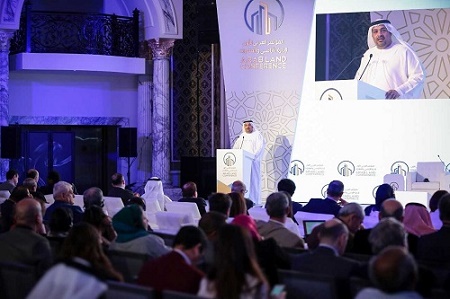1st Arab Land Conference

In early 2018, the Dubai Land Department played host to the 1st conference seeking solutions to the diverse challenges facing the land sector in the Arab world. The gathering, organized in partnership with the World Bank, the Global Land Tool Network, UN-Habitat, the League of Arab States and the Arab Surveying Association, was attended by more than 300 representatives of governments, private sector, civil society, academia, professionals, international and regional organizations and relevant stakeholders. All shared the conference objectives of knowledge exchange, enhanced regional cooperation, capacity development, and innovation in land management and real estate reform to promote social and economic development in the Arab region.
Two in One
For some, the 1st Arab Land Conference could be seen as two conferences in one. The socially oriented subjects of refugee and IDP land restitution and gender equality cohabited with panels and workshops dedicated to maximizing private property and urban development as the dominant subjects of land. The host organization, local and government participants conspicuously occupied that aspect of the program.
Civil society organizations were represented in the Technical Sessions that addressed the current crises afflicting the region’s land. Notably, Jamal Talab al-Amleh, director of Land Research Center (Palestine), provided the essential legal and administrative tools used in Israel’s deprivation Palestinian’s land rights in the occupied Palestinian territory and posed remedies requiring a return to the minimum rules of international law. His was also a voice raising questions about FAO agricultural-development practices in his country, where experience has shown that international technical experts in the field still need capacity to grasp the realities of operating under colonization.
Refugee and displaced persons housing, land and property issues could not be contained in a single event, and so a follow-up Technical Session on “Protection of Land and Property Rights of Displaced People and Refugees” featured experience from the field of refugee assistance. HIC-HLRN Coordinator Joseph Schechla also addressed the “Challenges and Priorities for Arab Land Restitution within International Law Norms” in that session. He made a rare attempt to quantify the refugee, displaced and occupied people’s lands subject to restitution across the region and laid out the normative international law framework that guarantees refugees’ and IDPs’ HLP rights and binds states to effect reparations. He cited the unfulfilled restitution of properties to a conservatively estimated 31 million Arab dispossession victims through a century of what he called
“protracted impunity.”
Honors
On the other side of the subject of Arab land, the conference’s closing ceremony especially honored the United Arab Emirates ranking first among Arab countries in the speed and volume of real estate registrations that now have reached 10th in the world. The Hashemite Kingdom of Jordan was honored also for developing its real-estate business during the past year, rising from 96th to 72nd according to the World Bank’s global ranking.
At the same event, the delegation of the Kingdom of Bahrain found an opportunity to announce the launch of the Real Estate Regulatory Authority (RERA), expressing pride in this step that they hope will make that Bahrain one of the investment destinations in the region in a way that supports the vision of the kingdom`s leadership and government.
Looking to the Future
Under competing titles, participants in both the 1st Conference on Arab Land Governance and/or the 1st Arab Land and Property Management Conference acclaimed the outcome Dubai Declaration. It recommendations addressed the need to modernize land management, administration and governance in Arab countries to ensure full protection of land as “a property right”; promote social and economic development and investment, economic diversification and facilitate improved service delivery; and ensure the sustainable use of land resources for the current and future generations.
On a more socially oriented note, one recommendation identified the most pressing challenges for full protection of property rights for all segments of the population, land use and land-related conflicts, difficult access to land for women, youth and marginalized communities at affordable prices, land tenure security for vulnerable urban and rural populations, the accuracy and effectiveness of land management processes and practices, and the need to improve the capacity of regional and local institutions to address the challenges of land management in a comprehensive and integrated manner.
At the closure, Joseph Schechla reflected that “this first conference has been an experiment to merge—if not yet reconcile—private interests with the public interests and socially responsible land governance urgently needed. Future Arab Land Conferences will tell how those representing the divergent approaches listen to each other across the divide.” In conclusion, the participants called for the continuation of this effort, through the promotion and deepening of knowledge sharing, research and capacity-building among Arab States, to further develop land management and real estate reform for the benefit of all residents of the region.
Download final declaration
See a more-detailed report (English)
See conference website
|